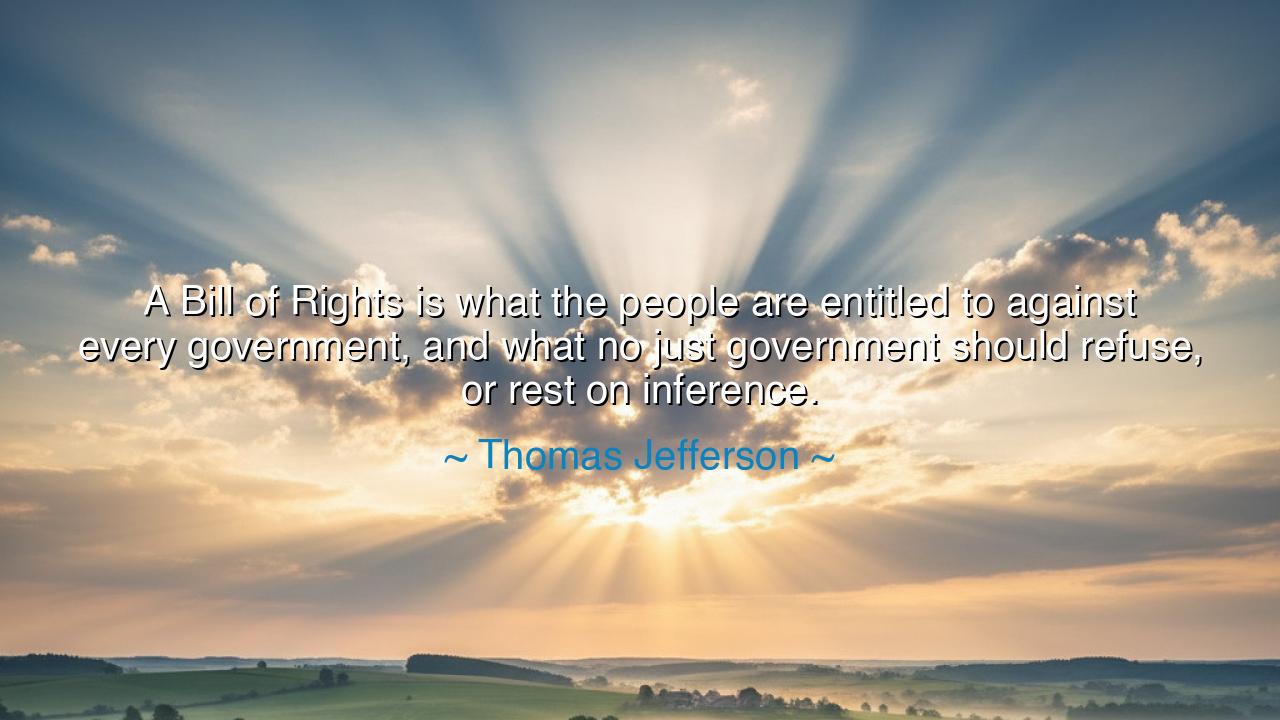
A Bill of Rights is what the people are entitled to against every
A Bill of Rights is what the people are entitled to against every government, and what no just government should refuse, or rest on inference.






When the fires of revolution had cooled and a new nation stood trembling on the threshold of freedom, Thomas Jefferson, the philosopher of liberty, wrote with the solemn clarity of a man who had seen both tyranny and hope: “A Bill of Rights is what the people are entitled to against every government, and what no just government should refuse, or rest on inference.” These words were not spoken lightly; they came from a heart steeped in struggle and a mind sharpened by history. In them lies the eternal truth that freedom is not a favor granted by rulers but a birthright inherent to all human beings — a sacred trust that must be written, guarded, and never left to assumption.
The origin of this quote reaches back to the dawn of the American Republic. After the Constitution of the United States was drafted in 1787, a great debate rose among the founders. Many hailed it as the foundation of liberty, but Jefferson, then serving as ambassador to France, wrote letters warning that the new government might one day forget its limits. He saw, as only the wise can, that power, even when born of good intentions, tends to expand until it threatens the very rights it was created to protect. In a letter to James Madison, his trusted friend and fellow architect of the republic, Jefferson argued that a Bill of Rights — a written covenant of liberty — was not optional but essential. “Let us not rest on inference,” he said in essence, for inference is the frailest shield against the ambition of men.
What Jefferson feared was the silence of unwritten promises. Governments, he knew, can twist and bend the law to suit their convenience, but they cannot easily erase what is etched in writing and sealed in the people’s memory. A Bill of Rights stands as a fortress — its walls built not of stone but of words, yet stronger than armies. It proclaims to every ruler and official: Thus far shall you go, and no further. It enshrines the eternal principles of freedom of speech, religion, press, assembly, and due process, ensuring that liberty is not dependent upon the goodwill of those in power. Jefferson’s wisdom was vindicated when, in 1791, Madison and others secured the adoption of the first ten amendments, giving form to the very safeguard Jefferson had demanded.
Throughout history, his insight has echoed in the struggles of nations that forgot or ignored such protections. Consider England, where centuries before, King John was forced to sign the Magna Carta in 1215 — the first great charter to declare that even kings are bound by law. That document, like Jefferson’s envisioned Bill of Rights, was born from resistance to oppression. Yet history also shows that when such guarantees are vague or unwritten, they vanish in the hands of tyrants. The French Revolution, for all its fervor, lacked lasting protections for individual liberty; its leaders proclaimed the “Rights of Man,” but without the restraint of law, the declaration dissolved into terror. Jefferson, who witnessed that chaos firsthand in Paris, learned the timeless lesson: rights must be written, or they will be lost.
But Jefferson’s statement carries not only political wisdom — it bears a moral weight as well. He speaks to the sacred relationship between the people and their government, reminding all generations that authority exists to serve, not to command. “No just government,” he said, “should refuse” such a Bill, for justice itself demands humility. A government that fears to define its limits is one that dreams of overreach. A just government, by contrast, welcomes the boundaries that keep it from becoming a master. The Bill of Rights, then, is not a restraint upon virtue but the proof of it — the mark of a government that honors its citizens as the true sovereigns.
And yet, Jefferson’s warning still resounds across time. For even in lands where rights are written, their defense depends not on parchment alone but on the vigilance of the people. Words can be twisted, and freedoms can decay in silence. The document may live, but the spirit may die. Each generation must, therefore, renew its covenant with liberty — not by rebellion, but by remembrance; not by suspicion, but by participation. The Bill of Rights is not a relic to be admired; it is a mirror held up to every citizen, asking: Do you still claim the freedom it protects? Do you still guard it as fiercely as your forebears did?
The lesson Jefferson imparts is clear and immortal: freedom must never rest on inference. It must be written, spoken, lived, and defended. Governments are mortal, but the rights of man are eternal; they are the birthright of every soul and the boundary of every throne. To protect them is not only a civic duty but a sacred calling. Let us therefore cherish the written word that guards the unwritten truth — that all men and women are born free.
So remember the wisdom of Thomas Jefferson, the sentinel of liberty: “A Bill of Rights is what the people are entitled to against every government.” His words are not bound to America alone; they belong to all who seek to live as free beings beneath the sky. Write your freedoms into law, and write them also upon your heart. For as long as they are remembered, tyranny will tremble — and the light of liberty will never be extinguished.






AAdministratorAdministrator
Welcome, honored guests. Please leave a comment, we will respond soon